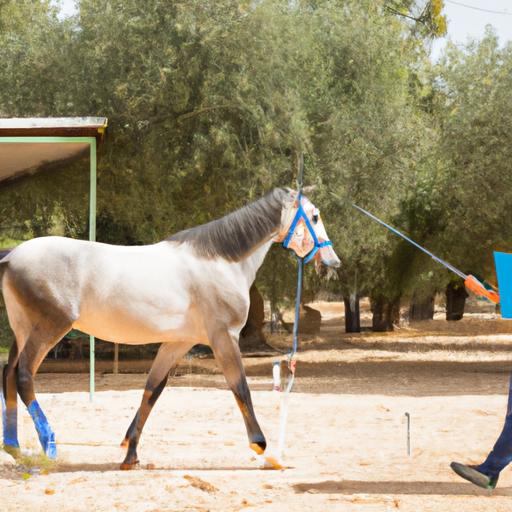Unlock your horse’s full potential with a structured weekly horse training schedule. Learn effective tips for consistency, monitoring, variety, and feedback assessment.
As horse enthusiasts, we all want our equine companions to perform at their best. Whether you’re a seasoned equestrian or a passionate beginner, mastering the art of training is crucial for your horse’s development. That’s where a well-structured weekly horse training schedule comes into play. By implementing a consistent routine, you can unlock your horse’s full potential and witness remarkable progress in their performance.
A. Importance of a Structured Training Schedule for Horses

Imagine embarking on a journey without a roadmap. It would be chaotic, confusing, and undoubtedly hinder your progress. The same applies to horse training. Without a structured schedule, your training sessions may lack direction, leading to wasted time and limited results. A weekly horse training schedule provides the framework necessary for a systematic approach to training.
By establishing a regular routine, your horse becomes familiar with the training process, allowing them to anticipate and engage in each session more effectively. This consistency builds trust and confidence between you and your horse, fostering a harmonious partnership. Moreover, a structured schedule helps you track your horse’s progress, identify areas that require improvement, and tailor your training methods accordingly.
B. Benefits of Following a Weekly Training Routine

Consistency is the key to success when it comes to horse training. By adhering to a weekly training routine, you provide your horse with a stable and predictable environment, which can yield numerous benefits. Firstly, a structured schedule aids in developing your horse’s physical fitness, ensuring they are in optimal condition for various activities such as jumping, dressage, or trail riding.
Furthermore, a weekly training routine enhances your horse’s mental well-being. Horses are intelligent creatures that thrive on mental stimulation. Through regular training sessions, you stimulate their minds, preventing boredom and potential behavioral issues. Additionally, a consistent schedule promotes a healthy bond between you and your horse, as it fosters trust, respect, and effective communication.
In conclusion, a structured weekly horse training schedule is vital for unlocking your horse’s full potential. By providing direction, consistency, and mental stimulation, you set the stage for remarkable growth in their performance. In the following sections, we will delve deeper into creating an effective training schedule, outlining essential components, and offering valuable tips for implementation. Let’s embark on this journey together and witness your horse’s transformation. Remember, horsemasterypro.com is here to support you every step of the way.
Creating a Weekly Horse Training Schedule
Assessing Your Horse’s Current Fitness Level
Before diving into a weekly training schedule, it’s essential to assess your horse’s current fitness level. Just like humans, horses have different levels of athleticism and conditioning. By evaluating their fitness, you can tailor the training program to their specific needs and avoid pushing them beyond their capabilities.
Start by observing your horse’s overall body condition, muscle tone, and cardiovascular endurance. Assess their flexibility, balance, and coordination during various movements. This assessment will help you identify any areas of weakness or stiffness that may require targeted exercises or additional attention.
Setting Training Goals and Objectives
To create an effective weekly horse training schedule, it’s crucial to establish clear goals and objectives. What do you want to achieve with your horse? Are you aiming to improve their jumping technique, enhance their dressage performance, or simply enhance their overall fitness? Define your objectives and set realistic goals that align with your horse’s abilities.
By setting specific, measurable, attainable, relevant, and time-bound (SMART) goals, you can track your progress and stay motivated throughout the training journey. Break down larger goals into smaller milestones, allowing for a sense of accomplishment along the way. Remember, each horse is unique, so tailor your goals to suit their individual strengths and weaknesses.
Determining the Frequency and Duration of Training Sessions
Once you have assessed your horse’s fitness level and established your goals, it’s time to determine the frequency and duration of your training sessions. Consistency is key, but it’s important to strike a balance between training and allowing your horse sufficient rest and recovery.
Consider factors such as your horse’s age, fitness level, and the intensity of the training activities. Younger horses may require shorter, more frequent sessions to prevent fatigue and maintain their focus. Conversely, seasoned horses may benefit from longer, less frequent sessions to challenge their endurance and refine their skills.
Incorporate rest days into your weekly schedule to give your horse’s muscles and mind a chance to recover. Remember, rest is just as important as training when it comes to achieving optimal performance.
In the next section, we will explore the key components of an effective weekly horse training schedule, ensuring a well-rounded approach to your horse’s development. So, let’s continue our journey towards unlocking your horse’s full potential.
Components of an Effective Weekly Horse Training Schedule
To maximize your horse’s training potential, it is crucial to include various components in your weekly training schedule. By incorporating a well-rounded approach, you can address different aspects of your horse’s development and ensure a balanced training regimen. Let’s explore the key components that make up an effective weekly horse training schedule.
A. Warm-up and Cool-down Exercises
Just like humans, horses benefit from warm-up and cool-down exercises before and after each training session. These exercises prepare your horse’s muscles, joints, and cardiovascular system for the upcoming activity while aiding in the prevention of injuries. Warm-up exercises can include walking, trotting, and gentle stretching, gradually increasing the intensity. Similarly, cool-down exercises involve gradually reducing the intensity of the workout and allowing the horse to relax and recover.
B. Cardiovascular Training and Endurance Building
Cardiovascular training is essential for developing your horse’s stamina and endurance. Engaging in activities such as trotting, cantering, or galloping not only strengthens the cardiovascular system but also improves lung capacity. By gradually increasing the duration and intensity of these exercises, you can enhance your horse’s overall fitness level and endurance, allowing them to perform at their best during competitions or trail rides.
C. Strength and Conditioning Exercises
Building strength and conditioning is crucial for your horse’s overall performance and athleticism. Strength exercises, such as hill work or pole exercises, target specific muscle groups and help develop power and agility. Conditioning exercises, on the other hand, focus on improving your horse’s overall fitness and muscle tone. Incorporating exercises like lunging, longeing, or interval training can help achieve these goals effectively.
D. Skill Development and Precision Training
To enhance your horse’s skills and performance in specific disciplines, skill development and precision training are essential. This component of the training schedule focuses on refining movements, transitions, and techniques relevant to your chosen discipline, whether it’s dressage, jumping, or reining. By dedicating training sessions to these specific skills, you can improve your horse’s precision, responsiveness, and overall performance in the show ring or on the trail.
E. Rest and Recovery Periods
Rest and recovery periods are equally important as training sessions. These periods allow your horse’s body to recuperate and adapt to the physical demands of training. Adequate rest reduces the risk of overtraining, fatigue, and injuries. Including rest days or light activity days in your weekly training schedule ensures that your horse has time to recover and rejuvenate, ultimately leading to improved performance and overall well-being.
By incorporating these key components into your weekly horse training schedule, you provide a well-rounded approach to your horse’s development. Each component plays a vital role in building strength, endurance, and skills while prioritizing your horse’s physical and mental well-being. In the next section, we will explore a sample weekly horse training schedule, demonstrating how these components can be structured for optimal results.
Sample Weekly Horse Training Schedule
Creating a well-balanced and effective weekly horse training schedule is essential for your horse’s development. To help you get started, here is a sample schedule that incorporates various aspects of training to ensure your horse’s overall growth and performance.
A. Monday: Cardiovascular Training and Endurance Building
Kickstart the week with a focus on cardiovascular training and endurance building. Engage your horse in activities such as trotting or cantering to elevate their heart rate and improve their stamina. This session will not only boost their cardiovascular fitness but also prepare them for more intense training in the days to come.
B. Tuesday: Skill Development and Precision Training
On Tuesdays, shift your focus to skill development and precision training. This is the perfect opportunity to work on specific exercises that enhance your horse’s agility, responsiveness, and coordination. Incorporate lateral movements, transitions, and precision exercises like circles or figure eights to fine-tune their skills and improve their overall performance.
C. Wednesday: Rest and Recovery
After two days of intense training, it’s important to give your horse a well-deserved rest day on Wednesday. Allow them to relax and recover both physically and mentally. Turn them out in a pasture or engage in light, leisurely activities like a gentle trail ride. Remember, rest is just as crucial as training to prevent overexertion and maintain your horse’s well-being.
D. Thursday: Strength and Conditioning Exercises
Thursday is dedicated to strength and conditioning exercises. Focus on building your horse’s muscle strength, particularly targeting their core, hindquarters, and back. Incorporate exercises like hill work, pole work, or cavaletti exercises to engage their muscles and improve their overall strength and stability.
E. Friday: Skill Development and Precision Training
Similar to Tuesday’s session, Friday is another opportunity to focus on skill development and precision training. Revisit exercises that require accuracy and precision, such as lateral movements, lead changes, or collection work. This session further refines your horse’s skills and helps them master advanced maneuvers.
F. Saturday: Cardiovascular Training and Endurance Building
Return to cardiovascular training and endurance building on Saturday to ensure consistent improvement. Engage in longer-duration exercises like extended trotting or cantering to further enhance your horse’s cardiovascular fitness and stamina. This session helps increase their endurance, preparing them for demanding activities.
G. Sunday: Rest and Recovery
Wrap up the week with another day of rest and recovery on Sunday. This allows your horse to recharge and rejuvenate, ensuring they start the next week refreshed and ready for training. Use this day to focus on light activities like grooming, stretching exercises, or simply spending quality time bonding with your horse.
By following this sample weekly horse training schedule, you can ensure a well-rounded and progressive training routine for your equine partner. Remember to adapt and modify the schedule based on your horse’s individual needs and capabilities. Stay tuned as we explore essential tips for implementing and optimizing your training schedule in the upcoming sections.
Conclusion
In the world of equestrianism, a well-structured training schedule is the key to unlocking your horse’s full potential. By adhering to a weekly horse training routine, you provide your equine companion with consistency, direction, and mental stimulation, setting the stage for remarkable growth in their performance.
Throughout this article, we have explored the importance of a structured training schedule for horses and the benefits it brings. From developing physical fitness to enhancing mental well-being, a weekly routine offers a stable and predictable environment for your horse to thrive in.
To effectively implement a weekly horse training schedule, remember these valuable tips:
Consistency in Training Sessions
Consistency is the foundation of success. Stick to your predetermined training schedule, ensuring that you allocate sufficient time for each session. Regularity builds trust and confidence between you and your horse, maximizing the effectiveness of your training efforts.
Monitoring and Adjusting the Schedule as Needed
Be attentive to your horse’s response and progress during training sessions. Monitor their energy levels, performance, and overall well-being. If necessary, make adjustments to the schedule to accommodate their needs and optimize their development.
Incorporating Variety and Challenging Exercises
Keep your horse engaged and motivated by incorporating a variety of exercises into your training routine. This not only prevents boredom but also allows for the development of well-rounded skills. Introduce new challenges gradually, pushing your horse’s limits while ensuring their safety.
Assessing and Responding to Your Horse’s Feedback and Performance
Your horse is an expert communicator, and it’s crucial to pay attention to their feedback. Observe their body language, responsiveness, and willingness to participate in training. Adjust your approach accordingly, tailoring the training sessions to meet their individual needs.
In conclusion, a well-planned and executed weekly horse training schedule is the key to unlocking your horse’s full potential. By providing structure, consistency, and mental stimulation, you create an environment where your horse can thrive and excel. Embrace the journey, embrace the transformation, and let Horsemasterypro.com be your trusted guide along the way. Together, we can achieve greatness for you and your equine partner.


